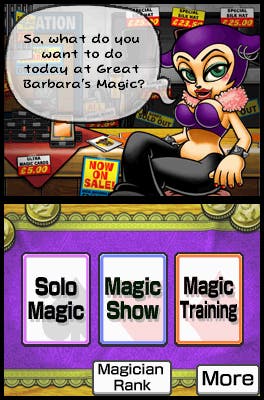Magic Made Fun
Because it was such a serious business before?
There are two types of people when it comes to magic tricks. (Well, three - there's those miserable sods who don't enjoy them at all, but we'll ignore them for now). The first sees a trick, is baffled by it, and feels entertained by the mystery. The second sees a trick, is baffled by it, and must know how it is done at all costs.
That second group might seem like the unlucky one. To be able to take pleasure from the mystery - that's a moment of pure joy. But needing to know how isn't necessarily a bad thing. For the first group, finding out how a trick is done is to destroy it, because the reality is that most tricks are horribly simple and disappointing. But for the second group, the simplicity is the joy - the execution, the technique and the process of being fooled - that's a beautiful thing. I'm firmly in that second group - if I see a trick I'm not only not happy until I know how it's done, but not until I've learned how to perform it myself. It's to the second group that Magic Made Fun is aimed. It's the first group who buyers should aim to impress.
It's probably important to note that Magic Made Fun isn't that good. It's far too stunted, with far too few tricks available, and for reasons unfathomable it limits your access to them by insisting you unlock new tricks by earning points, and severely limiting how many points you can earn each day. Damn it, I paid for this. Let me get at the thing I paid for! (Well, I didn't pay for it - Tom sent it to me in the post, but I'm empathising.)

However, it's a really good idea. Things are split into three sections: Solo Magic, Magic Show and Magic Training. Solo is a bunch of tricks the DS plays on you, or to whomever you hand the DS. Magic Show is a collection of tricks it teaches you to perform that involve the DS, explaining the secrets and teaching you how to execute them effectively. And Magic Training is, well, it's a collection of rather lame mini-games in the Brain Training style. Or as I consider them, a place for grinding points to open up new tricks. You know, after I've lied to my DS about it being the next day. Again.
Solo Magic is mostly made up of tricks based on mathematics, but with various means of hiding this from you. If you've ever seen Uri Geller's embarrassingly idiotic tricks where he lies to the audience telling them he's influencing their decision with the power of his mind, causing you to choose a particular planet from a circle, or whatever, you'll know the sort of thing. Anyone with an IQ above 0 will realise they could pick any starting point and receive the same results. Still, here they're presented as tricks, rather than deceit, and it can be fun the first time. Of course, do them again and you'll quickly see through how they work.
Magic Show is far closer to the grisly truth of how most magic works. A trick might involve telling your audience that the DS can psychically predict which of two candles they wish to be blown out when they blow on the mic. Or somehow know which of three objects has been silently selected. Like most magic, the solutions lie in working backward from the result until the moment of deception is identified. These can be really subtle, with the game taking specific advantage of the DS, like how easy it is to hit a shoulder button with no one seeing, or its ability to recognise different voice commands.

